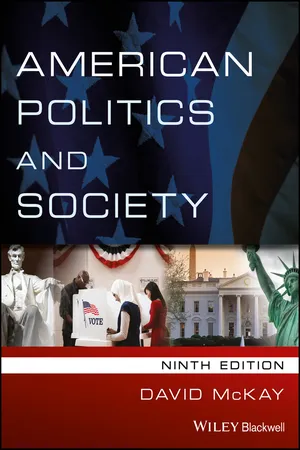Politics & International Relations
House of Representatives
The House of Representatives is one of the two chambers of the United States Congress, with the other being the Senate. It is composed of representatives from each state, with the number of representatives determined by the population of each state. The House has the primary responsibility for initiating revenue-related bills and has the power to impeach federal officials.
Written by Perlego with AI-assistance
Related key terms
6 Key excerpts on "House of Representatives"
- eBook - ePub
American Government
Conflict, Compromise, And Citizenship
- Christopher J Bosso, John Portz, Michael Tolley(Authors)
- 2018(Publication Date)
- Routledge(Publisher)
Even its defenders admit that Congress is often unable to make quick decisions. Speed, however, is not always the important point. As a representative body, Congress is primarily a deliberative assembly, a forum in which the people’s representatives can debate the major issues. As such, who these representatives are, and how they get to Congress, matters a great deal.THE REPRESENTATIVE SYSTEMThe United States has roughly 270 million people, yet only 535 men and women serve as fall members of Congress. At present there are 435 members of the House of Representatives, as well as nonvoting delegates from Guam, Puerto Rico, American Samoa, the District of Columbia (Washington, D.C.), and the American Virgin Islands. There are only 100 senators, two from each state. So opportunities to be a member of Congress are few, and the process of getting elected is rigorous enough to screen out all but the most exceptional (not to mention lucky) candidates.Congress is a bicameral, or two-chamber, legislature. As we noted in chapter 2 , members of the House of Representatives (the “lower” chamber) serve for two years, and all 43 5 must seek reelection every second year. House members represent districts whose shape and composition is determined by state legislatures, and the number of districts per state varies according its to overall population (each state is guaranteed at least one House seat). House members have always been elected by popular, or direct, vote, as provided by Article I, Section 2 of the Constitution.Every state, regardless of its population, has two senators. Senators serve for six years, with the terms staggered so that only one-third of the “upper” chamber comes up for reelection every other year. Until the 20th century, senators were generally chosen by their respective state legislatures, which was meant to guarantee that the interests of the states would be defended against the more populist passions generally found in the House. Since the passage of the Seventeenth Amendment to the Constitution in 1913, senators have been elected by direct vote. - eBook - ePub
- David Silverberg(Author)
- 2011(Publication Date)
- For Dummies(Publisher)
Chapter 2
Running Your House: The House of Representatives
In This Chapter:
Comparing your house to The HouseTracking down your representativeDiscovering what your representative’s job isRealizing the responsibilities of the House of RepresentativesCreating House districtsO f all federal government institutions, the House of Representatives is the one that’s closest to you. It’s the body designed to most closely reflect your cares and concerns and the one that’s easiest for you to contact. The House is the starting point when you want to register an opinion or get a law passed.— Alexander Hamilton or James Madison writing as “Publius” in “The Federalist No. 57”“Such will be the relation between the House of Representatives and their constituents. Duty, gratitude, interest, ambition itself, are the chords by which they will be bound to fidelity and sympathy with the great mass of the people.”Knowing your congressional representative and the district he represents is important, because regardless of other identities you may have, you’re definitely a constituent of that representative. Although you may not know him personally, or agree with his politics, or even like him, he is your advocate in Washington and representing your interests is his job. If you don’t like the way he’s doing the job, you have the chance to have him fired (by voting for someone else) every two years.Describing the House
The House of Representatives consists of 435 representatives, each one representing a congressional district in one of the 50 United States. In addition, four delegates represent the U.S. territories of American Samoa, Guam, the Virgin Islands, and the District of Columbia. The territory of Puerto Rico is represented by a resident commissioner - eBook - ePub
The Cost of Congress
What Americans Get for Their Money
- Karen Kunz, Stavros Atsas(Authors)
- 2022(Publication Date)
- Praeger(Publisher)
CHAPTER THREEThe House of RepresentativesThe House is the direct descendent of the House of Commons. The House of Commons was, in fact, the first modern staple of the right of common people . . . the whole notion was that you can’t raise money for the government without the approval of those from whom the money comes . . . any year they refuse to continue funding, the president can’t veto [that]. So, there is enormous latent power in the House and Senate. And since the House originates spending and originates taxing bills, the House is, in fact, quite adequate as an institution—any time it wants to [be].—Roger H. Davidson, Susan Welch Hammond, and Raymond W. Smock. Masters of the House.Think of the House of Representatives as a huge freshman dorm on a college campus.—Senator Tom Daschle and Charles Robbins. The U.S. Senate.So far, we’ve discussed the job descriptions and working conditions for our members of Congress. We know what the Constitution expects. We know how often members are on the job, along with the fiscal and physical support they get, including staff, salaries, benefits, and perks. We now know that they work two part-time jobs—one for the public and one for donors and lobbyists–and what they get paid for each job.1Ever wonder what they do during the time they are in session, when they are working for us? We’re not talking about the time they spend “smiling and dialing” here; rather, we’re talking about the time they actually put in for us.The Constitution charges the House and Senate with distinctive and complementary duties, including passing legislation, overseeing the Executive Branch’s implementation and administration of those laws and investigating occurrences of inappropriate behavior, confirming presidential appointments (cabinet members, directors, and judges), and approving treaties and declaring war. These functions are all unique to the Legislative Branch and embody the checks and balances envisioned by the nation’s founders. - eBook - ePub
- David McKay(Author)
- 2017(Publication Date)
- Wiley-Blackwell(Publisher)
Chapter 8 Congress I The People’s Branch?Outline
- Representation and Congress
- Briefing: Forms of Representation
- Congressional Elections
- Legislators as Rational Actors
- The Work of Members of Congress
- Conclusions
- Summary
- Questions for Discussion
- Glossary
- Notes
- Further Reading
About half the population thinks that every person in Congress, including their own representative, should be thrown out. That’s the center not holding.– NOAM CHOMSKY, 2013The US Congress is usually – and accurately – referred to as the most powerful legislature in the world. While a common trend in other democratic countries has been the rise of powerful executives and the relative decline of assemblies and parliaments, Congress has been remarkably successful in maintaining its independence from executive influence. This is not to deny that the powers and functions of Congress have changed over time. Clearly they have, and the particular way in which the institution operates today is very different even from 20 years ago. But throughout its history, Congress has remained an essentially autonomous institution. Even during periods of executive ascendancy – most recently during the Johnson and Nixon years and in the post-9/11 Bush years – Congress never became the mere instrument of presidents.The independence of Congress derives in part from its constitutionally defined powers and in part from the particular way in which the American party system has evolved. Constitutionally, Congress was given three main powers, all of which remain important today. First, all legislative power is vested in the House of Representatives and the Senate, and within this broad function Congress is given special powers to appropriate monies, raise armies and regulate interstate commerce. Second, the House of Representatives has a constitutionally established right to declare war. Finally, the Senate is specifically empowered to ratify treaties and approve appointments by the president to the judiciary and executive branch. The House can impeach executive judicial officers for wrongdoing and the Senate is charged with the responsibility for trying impeached officers. In addition, from very early in its history, Congress established the right to oversee and investigate the behaviour of the executive. In total these powers are impressive, especially when it is remembered that originally Congress was expected to be the major initiator as well as approver of legislation. As with other legislatures around the world, Congress has partly (although by no means entirely) forfeited the responsibility for initiating legislation to the president. Unlike most other assemblies, however, Congress retains an independent power to approve legislation, appropriate monies and generally oversee the executive branch. - eBook - ePub
- Woodrow Wilson(Author)
- 2011(Publication Date)
- Wilson Press(Publisher)
The House and Senate are naturally unlike. They are different both in constitution and character. They do not represent the same things. The House of Representatives is by intention the popular chamber, meant to represent the people by direct election through an extensive suffrage, while the Senate was designed to represent the states as political units, as the constituent members of the Union. The terms of membership in the two houses, moreover, are different. The two chambers were unquestionably intended to derive their authority from different sources and to speak with different voices in affairs; and however much they may have departed from their original characters in the changeful processes of our politics, they still present many sharp contrasts to one another, and must be described as playing, not the same, but very distinct and dissimilar rôles in affairs.Perhaps the contrast between them is in certain respects even sharper and clearer now than in the earlier days of our history, when the House was smaller and its functions simpler. The House once debated; now it does not debate. It has not the time. There would be too many debaters, and there are too many subjects of debate. It is a business body, and it must get its business done. When the late Mr. Reed once, upon a well-known occasion, thanked God that the House was not a deliberate assembly, there was no doubt a dash of half-cynical humor in the remark, such as so often gave spice and biting force to what he said, but there was the sober earnest of a serious man of affairs, too. He knew the vast mass of business the House undertook to transact: that it had made itself a great organ of direction, and that it would be impossible for it to get through its calendars if it were to attempt to discuss in open house, instead of in its committee rooms, the measures it acted upon. The Senate has retained its early rules of procedure without material alteration. It is still a place of free and prolonged debate. It will not curtail the privilege of its members to say what they please, at whatever length. But the senators are comparatively few in number; they can afford the indulgence. The House cannot. The Senate may remain individualistic, atomistic, but the House must be organic,—an efficient instrument, not a talkative assembly. - eBook - ePub
- Woodrow Wilson(Author)
- 2017(Publication Date)
- Routledge(Publisher)
The House and Senate are naturally unlike. They are different both in constitution and character. They do not represent the same things. The House of Representatives is by intention the popular chamber, meant to represent the people by direct election through an extensive suffrage, while the Senate was designed to represent the states as political units, as the constituent members of the Union. The terms of membership in the two houses, moreover, are different. The two chambers were unquestionably intended to derive their authority from different sources and to speak with different voices in affairs; and however much they may have departed from their original characters in the changeful processes of our politics, they still present many sharp contrasts to one another, and must be described as playing, not the same, but very distinct and dissimilar rôles in affairs.Perhaps the contrast between them is in certain respects even sharper and clearer now than in the earlier days of our history, when the House was smaller and its functions simpler. The House once debated; now it does not debate. It has not the time. There would be too many debaters, and there are too many subjects of debate. It is a business body, and it must get its business done. When the late Mr. Reed once, upon a well-known occasion, thanked God that the House was not a deliberate assembly, there was no doubt a dash of half-cynical humor in the remark, such as so often gave spice and biting force to what he said, but there was the sober earnest of a serious man of affairs, too. He knew the vast mass of business the House undertook to transact; that it had made itself a great organ of direction, and that it would be impossible for it to get through its calendars if it were to attempt to discuss in open house, instead of in its committee rooms, the measures it acted upon. The Senate has retained its early rules of procedure without material alteration. It is still a place of free and prolonged debate. It will not curtail the privilege of its members to say what they please, at whatever length. But the senators are comparatively few in number; they can afford the indulgence. The House cannot. The Senate may remain individualistic, atomistic, but the House must be organic, — an efficient instrument, not a talkative assembly.
Index pages curate the most relevant extracts from our library of academic textbooks. They’ve been created using an in-house natural language model (NLM), each adding context and meaning to key research topics.





